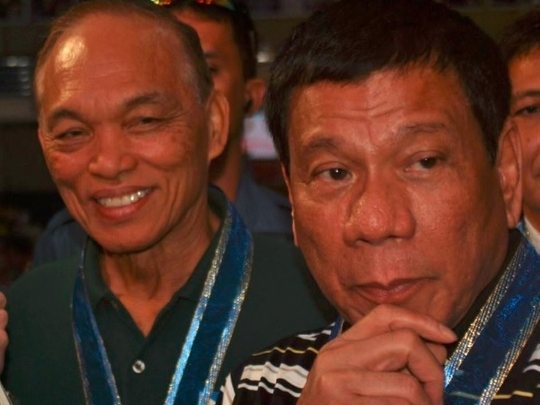
Manila: Sacking of government officials — especially police generals or former military officers who were given cilivian posts upon retirement — over allegations of corruption or misconduct is almost unheard of in the Philippines.
But now, there's a growing list of senior officials dismissed like clockwork. Philippine President Rodrigo Duterte has drawn popular support for his drive to root out drugs, corruption, influence peddling and government inefficiency.
The list includes a former military chief, the head of the energy board, five former police generals and two high ranking officers who sat on an infrastructure project for a year.
On Monday, retired General Dionisio Santiago, whom Duterte handpicked to head the Dangerous Drugs Board (DDB), but was involved in alleged junkets in Europe and America, was dismissed.
Dionisio, former chief of the Philippine military, also once headed the Philippine Drug Enforcement Agency (PDEA) under ex-President Gloria Arroyo.
Spokesman sacked, replaced by ‘naughty mouth’ lawyer
Duterte vows death for policemen who return to illegal drug-trade
Confirming the dismissal — or forced resignation — of Dionisio due to "junkets", the Philippine Presidential Palace on Monday also issued a warning to government executives travelling at the expense of taxpayers’ money.
“I would like to confirm that former General Santiago was let go by the President [Rodrigo Duterte] not only because of his statements on the Mega Rehab Centres,” Presidential Spokesperson Harry Roque Jr. said during a briefing at in Malacanang.
Philippines drug war under fire at UN rights council
Debate over Duterte’s confession
In an interview by a major news network last week, Santiago said the construction of the Mega Rehabilitation Centres for drug addicts inside Fort Magsaysay in Laur, Nueva Ecija, was unnecessary since travelling to visit detained relatives in the facility imposed a burden to the families.
But Roque said Santiago’s statement was not the real reason he was sacked by President Rodrigo Duterte.
“He was also let go because of complaints that he was using taxpayers’ money for junkets abroad,” he said, adding that side from his unnecessary trips, “Santiago may have accepted consideration from major drug player,” Roque said.
Roque said the sacking of Dionisio was a “strong message” to grafters and would-be grafters.
Clampdown
In July 2016, barely a month into the presidency, Duterte shocked the country when he publicly accused five police generals of involvement in the illegal drugs trade and said only he would be accountable for a bloody crackdown.
The following month, in August 2016, Duterte named eight magistrates, dozens of mayors and local officials and more than a hundred police and military officials among the names people involved in the drug trade.
At that time he said: “I am reading now the personalities in the Philippines … It might be true, it might not be true [linked to drugs] … These individuals may be charged criminally or administratively, this should have due process."
Aside from unleashing a campaign against drugs, Duterte has also clamped down on graft.
On Sunday, November 19, the president warned erring government officials that they would be forced to resign.
“All those executives who have been using money of the government, just easily going in and out of travel upon the invitation of whoever to take part in supposed seminars, they will be asked to resign, they are wasting the money of the people,” he said.
Drugs board employees' complaint
The complaints against Santiago were filed by the employees union of the board. The alleged letter was signed by Priscilla Herrera, who represents the Dangerous Drugs Board (DDB) Employees Union, and points to incidents of abuse of power.
The complaint, a copy of which has been circulating on social media, stated that Santiago had travelled to Vienna, Austria, with six other Dangerous Drugs Board employees to attend an ordinary Narcotic Drug Intercessional meeting.
The letter also cited other unnecessary overseas trips made by Santiago with some of his chosen staff and his mistress.
But more damning is the allegation by DDB employees that Santiago has become liability for Duterte.
The letter alleges that Santiago had received a mansion from the Parojinogs, a known drug-dealing family from Mindano, during Santiago's stint at the Philippine Drugs Enforcement Agency (PDEA) under president Gloria Arroyo.
Ozamiz city mayor Reynaldo Parojinog and wife were both killed during a dawn anti-drug raid by police in July.
Santiago, the letter stated, is also known to have unexplained wealth.
What spokesperson said
Asked whether allegations stated in letter had been vetted, Presidential Spokesman Harry Roque says the process had already been "overtaken" by Santiago's resignation.
"We have never alleged they are gospel truth," said Presidential Spokesman Harry Roque, who had sent a copy of the letter to reporters on Monday, November 20.
Roque repeated Duterte's policy of sacking appointees even with just a "whiff" of corruption. The spokesperson said anonymous letters would still warrant Duterte's attention.
Duterte had already fired a number of government executives as well as Cabinet members in his less than 18 months as president.
Dismissal from Grave Misconduct carries with it all accessory penalties, including the perpetual disqualification from holding public office and forfeiture of retirement benefits, according to the Office of the Executive Secretary.
Government officials fired recently:
October 6 — 2 Malacañang employees were fired for alleged influence peddling.
October 9 — Energy Regulatory Board Chairman Jose Vicente Salazar was fired over grave "serious dishonesty, gross neglect of duty, and grave misconduct".
October 9 — Two top officers of the Philippine National Police (PNP) named as 'narco-generals' by the president were sacked. They Chief Superintenent Edgardo Tinio, former director of Quezon City police and Director Joel Pagdilao, former police chief of Metro Manila.
October 14 — Two government officials were sacked them for sitting for one year on an infrastructure project meant to decongest Manila. The two officials were not immediately named.
November 20 — Retired General Dionisio Santiago was "let go" by Duterte as chairman of the Dangerous Drugs Board (DDB), following allegations of abuse of power and corruption.











